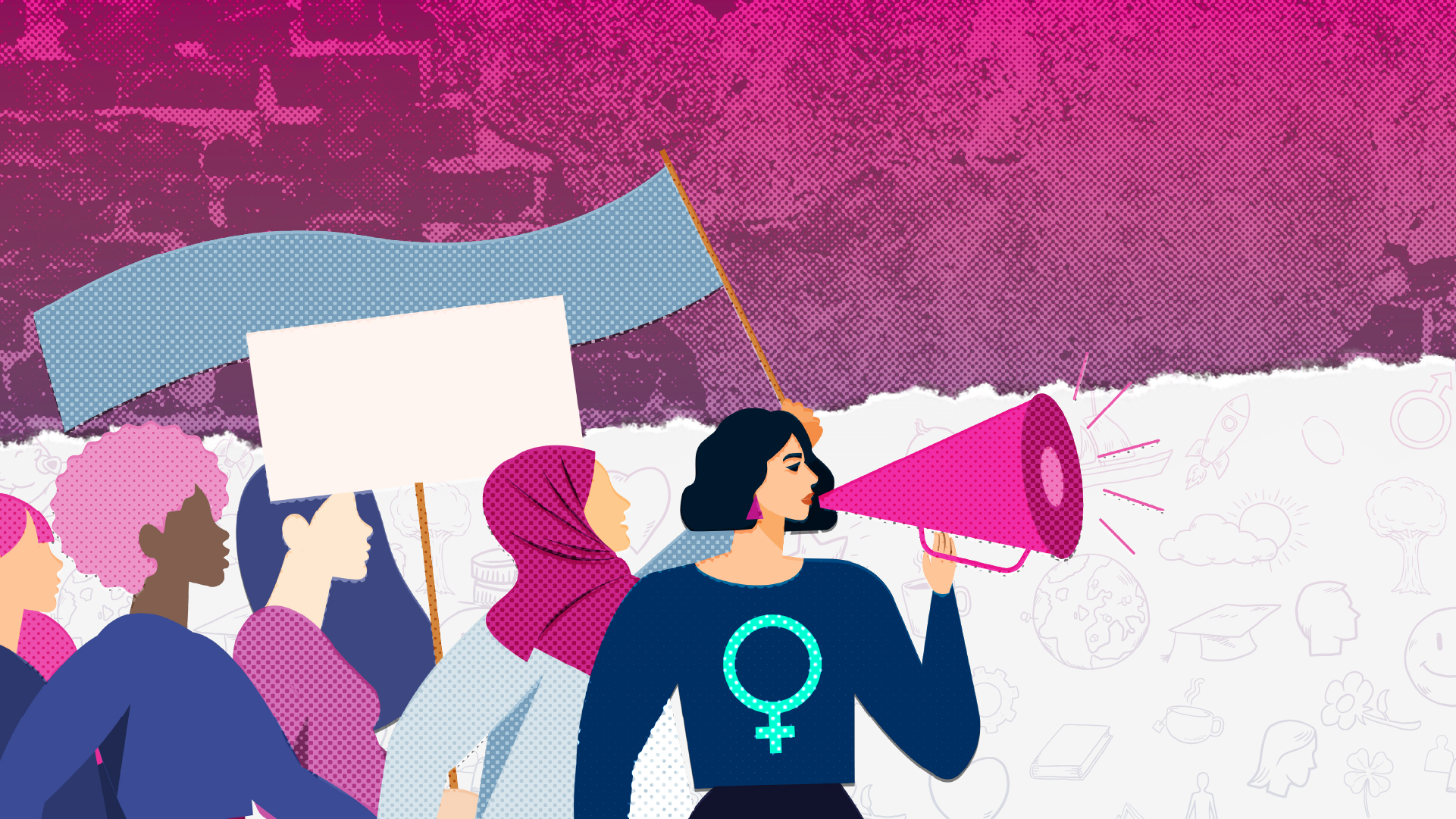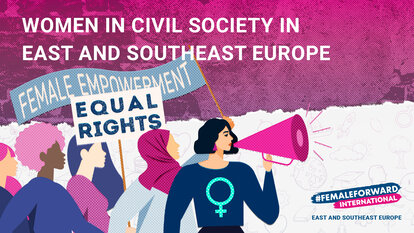#FemaleForwardInternational
Women in Civil Society in East and Southeast Europe

Back when women did not enjoy a full range of rights, were not successful businesswomen, nor prominent journalists, nor world leaders, the female movement was their principal way to express their strengths, ambitions, and beliefs. For decades, civil society has been a comfortable environment where females can express their opinions or publicise the issues they face.
Since every different country in East and Southeast Europe has its own complex relationship with feminism, each of their non-governmental sectors and women’s movements vary by its own specific nature. Thus, there are post-Communist countries like Romania and Bulgaria, though the youngest members of the European Union, trying to seem democratic and progressive. However, there are also situations like Turkey, with its struggles to acknowledge female freedoms and equality.
As civil society grows stronger and more and more female-focused organisations emerge, political and social backlash, as well as gender oppression, will continue to push back.
Over the last couple of years, I have noticed that civil society is becoming more united, so I hope that can help overcome the obstacles raised by the anti-gender movement, such as their opposition to ratification of the Istanbul Convention. All these things help the positive side of civil society to unite and work more together.
The female issues
A non-governmental organisation does not have to define itself as feminist in order to support female rights, empowerment, and equality between genders. For instance, as mentioned in a 2016 report, “Mapping of NGOs working for women’s rights in selected Member States”, requested by the European Parliament's Committee on Women's Rights and Gender Equality, there are non-governmental organisations like the Bulgarian Centre of Women in Technology or the Council of Women in Business in Bulgaria, which are not explicitly feminist, but deal with such issues. As Svetla Kostadinova, the executive director of the Bulgarian economic think tank Institute for Market Economics, observes, businesswomen are more and more present in the public eye lately. It is indeed the emergence of professional women’s organisations that show, in a way, that civil society helps with career development and can be a tool to diminish the “all male club” that different professions have had for centuries.
Another quite important part of civil society focuses on gender-based violence – an issue that the region is still struggling with. Countries might not have the strong institutions or legislation that can support women in these difficult times. So when needed, NGOs take over and provide them with help.
In this region, civil society organisations play a significant role because there is a lot of work to do. For example, the recent efforts to ratify the Istanbul Convention in Bulgaria and Turkey have been quite controversial. The non-governmental sector struggled to defeat the propaganda tools used by both politicians and other organisations that opposed the Convention. Denitsa Lyubenova is a Bulgarian lawyer who leads the legal programme of the Bulgarian NGO Deystvie (meaning “Action”). “Over the last couple of years, I have noticed that civil society is becoming more united, so I hope that can help overcome the obstacles raised by the anti-gender movement, such as their opposition to ratification of the Istanbul Convention. All these things help the positive side of civil society to unite and work more together”, she says. The situation was similar in Romania though the country eventually did ratify the Convention.
In Turkey, local journalist Burcu Karakas, employed by Deutsche Welle, explains that though abortion is legal there, it is somehow becoming less and less available. The country’s leadership’s rhetoric has become increasingly anti-abortion, so hospitals now pretend that they are not allowed to perform one. Thus, a strong female movement is needed to counter these negative trends.
“Non-governmental organisations in Turkey have been under increasing attack after the coup attempt [of 2016]… Detentions, arrests, or cases against members of civil society over their statements or even reports are now common”, Barış Altıntaş, the founder of Media and Law Studies, says. In such turbulent times, even more support will be required to protect female liberties.
Non-governmental organisations in Turkey have been under increasing attack after the coup attempt [of 2016]… Detentions, arrests, or cases against members of civil society over their statements or even reports are now common.
Civil society: female dominated
Anecdotal evidence in some countries like Bulgaria, for instance, shows that the non-governmental sector is dominated by women. “In the non-profit world, there are more women because they care more, it is the nature of women to be affected easily by problems. Women more or less believe they can address those problems'', says Svetla Kostadinova. However, there might be a darker reason behind female domination in the non-governmental sector: salary size. Civil society jobs are usually not highly paid, so men, perceived to be breadwinners in families, might avoid them.
Barış Altıntaş has another opinion. “There is no research on this question, but I wouldn’t describe it either as a male or female dominated area. To begin with, there are many women’s organizations and Turkey’s women’s movement has been very powerful for a long time”, she claims. Also, she adds that while females participate in the civil society sector, some other fields – like media or politics – are more restricted and that “women are left out in Turkey''. Thus, the best way for them to have any impact whatsoever is to join a NGO.
They manage to reach top positions as well. Svetla Kostadinova, by her own admission, is a leader at an economic NGO and she succeeded a man without any problems. Barış is the co-founder of an organisation as well, and she mentions that many of the leading human rights organizations in Turkey are also led by women.
The efforts of civil society are of key importance when it comes to dealing with gender-based violence and abortion rights in different countries.
The past and future of feminism
Women change people’s perceptions and even other women’s lives through their work in the civil society sector. Countries that used to be under totalitarian rule have a more fragile understanding of democracy and gender equality; thus, they need to be constantly reminded of these values.
Post-communist countries, for example, carry the burden of decades of non-liberal perceptions. Actually, feminist historians and philosophy groups have debated whether Communism was good for women. For example, Prof. Mihaela Miroiu, a Romanian philosopher, a prominent feminist, and an academic, explains that during Communism, prior to 1989, equality between all did not help females much. “In my opinion we cannot talk about feminism under communism. Feminism is a road to women’s autonomy and communism is a road to no one’s autonomy. It was impossible to have a different, dissident point of view”, she says. Also, she points out that the first independent organisation of women was actually in Russia. Thus, women’s civil society in Eastern Europe actually first appeared there; however, it was precisely the first Communist leader, Lenin, who rejected it and the organisation was eliminated, Prof. Miroiu explains. “In communism, feminism was understood as a bourgeois reactionary ideology. You cannot claim that something is feminist in this kind of regime”, the philosopher says.
As research by Pew Research Centre from 2019 shows, Eastern Europe is a lot less progressive than the West, especially on social issues like homosexuality and the role of women in society.
Women change people’s perceptions and even other women’s lives through their work in the civil society sector. Countries that used to be under totalitarian rule have a more fragile understanding of democracy and gender equality; thus, they need to be constantly reminded of these values.
Fortunately, there are heroes who work hard to alter this situation. As a lawyer, Denitsa Lyubenova is changing family policies and helping women with different sexual preferences to receive equal treatment just like ones who are in heterosexual couples. She faces double standards even in the European Union; the municipality in Sofia, the capital of Bulgaria, required evidence that a woman from a same-sex couple was the birth mother of her child in order to grant it citizenship and register it. After its refusal to register the baby, Denitsa and her clients appealed and the Bulgarian court decided to refer the case to the Court of Justice of the European Union. The hearing was in February 2021. The decision of this court might provide women in same sex couples the right to be mothers and for their children to receive citizenship.
Also, Prof. Mihaela Miroiu was the one who taught and inspired a generation of feminists in Romania. She has had such a strong influence in feminism that her “students”, the people that were inspired by her work and took up the fight, were the ones who actively participated in these new discussions on gender issues. Feminists in civil society not only fight in the present, but also create a better future.
In my opinion, we cannot talk about feminism under communism. Feminism is a road to women’s autonomy and communism is a road to no one’s autonomy. It was impossible to have a different, dissident point of view.
Follow more stories and analyses on female empowerment with #FemaleForwardInternational and in our Special Focus on the website.
This analysis is included in the #FemaleForwardInternational Publication.

